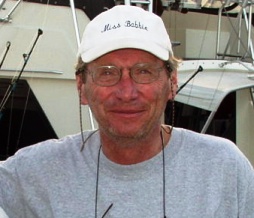 Catching is great. But, what Dr. Dave Conkle, owner and captain of the G&S 50, Miss Babbie, values most about sports fishing is the camaraderie. "The greatest joy my life long avocation has given me is the opportunity to meet and get to know so many wonderful, interesting and talented people," says Conkle.
Catching is great. But, what Dr. Dave Conkle, owner and captain of the G&S 50, Miss Babbie, values most about sports fishing is the camaraderie. "The greatest joy my life long avocation has given me is the opportunity to meet and get to know so many wonderful, interesting and talented people," says Conkle.
Raised on a farm in West Virginia some 40 miles north of Wheeling, West Virginia, Conkle got his angling start as a young grade-schooler fishing on creeks for catfish and carp. Later, he moved on to bass fishing on the state's rivers.
"I never did any saltwater fishing until the late 1970s," he says.
In 1978, Conkle left a teaching position at the National Heart Institute and moved his family to Pensacola, Florida. With the Gulf of Mexico now in his backyard, it was logical that Conkle would try his hand at offshore saltwater fishing.
Freshwater or saltwater, says Conkle, "The attraction of fishing for me was an escape. First, the escape was from work on the farm, and then later from the intensity of heart surgery. Fishing has also provided me with the opportunity to spend time with my boys, friends and now grandchildren."
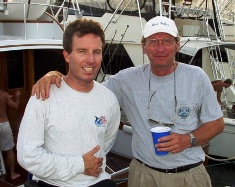 Photo: Friend Scott Kerrigan and Dr. David Conkle
Photo: Friend Scott Kerrigan and Dr. David Conkle
Conkle bought his first boat, a 25-foot Bertram, with a fellow physician he partnered with in his practice, and aptly named the vessel, Pair A Docs.
"We enjoyed fishing on that boat in the late 70s and early 80s, mainly catching smaller fish," he says. "It was in the mid-80s that I decided to get a boat of my own and restored a 31-foot Bertram. I fished that until the 1990s when I built my first G&S, a 41-footer, which I first brought down to St. Thomas in the summer of 2000."
Conkle named the 41-footer, Miss Babbie, in honor of his wife Barbara Conkle.
The 1980s and 1990s saw Conkle, his family and friends travel from Pensacola to Louisiana from late spring, through the summer to early fall.
"That was a wonderful time for all," he says.
In the Gulf of Mexico, Conkle adds, "it's difficult to target a species. Sure, blue marlin are the fish that we're all looking for and the white marlin bite used to be very good in the fall in the North Gulf. But in the Gulf of Mexico, if you don't enjoy stretching string, that means catching dolphin, wahoo and tuna on top of billfish, then you're not going to enjoy fishing here."
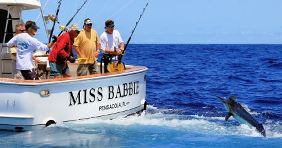 Photo right by: Richard Gibson
Photo right by: Richard Gibson
Conkle's best fish story comes right out of those years and right out of the Gulf of Mexico.
"We entered the Labor Day tournament held by the Big Game Club in Mobile, Alabama," he tells. "It was a tag and release tournament for us and it was one of the first times organizers required a video of the releases. Well, I was up operating all night and finally arrived to the boat about 4 a.m. I provisioned and got the boat ready. A friend said he'd take care of bringing the video camera. He did, but it looked like something right out of the era of Cecil B. DeMille. Well, we won the tournament. Tagged and released 5 white marlin in two days. We were all so happy until we reviewed the video. The camera hadn't been working well and we only got bits and pieces of footage. Little known to me, as I had left to take the boat back to Pensacola, a couple of my fellow anglers put a nick in the film so it would break when the committee went to look at it. The next morning, at the awards ceremony, the committee says, 'Oh, we knew you caught the fish, but we have to disqualify you because of the film.' The funny thing," says Conkle, "if we had won, one of the prizes was a brand new video camera!"
Conkle retired in 1999 and that's when he started traveling to fish. He flew to destinations such as Mexico, Guatemala, Venezuela and Ecuador and chartered, and he cruised Miss Babbie the 1800-mile distance to St. Thomas in the summer of 2000 for blue marlin.
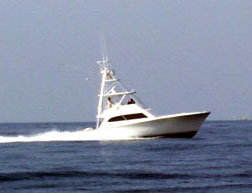 "As an owner/operator," says Conkle. "I'm running the boat, and I feel like I'm fully participating. Sure, I've caught a fair number of blue marlin myself. But, I enjoy helping other people catch marlin too. In fact, one of the nicest moments I've had while fishing is when a friend and his two sons all caught their first blue marlin on the same day on the North Drop with me on the new Miss Babbie. I've also had the opportunity to watch and help each of my three boys to catch their first billfish."
"As an owner/operator," says Conkle. "I'm running the boat, and I feel like I'm fully participating. Sure, I've caught a fair number of blue marlin myself. But, I enjoy helping other people catch marlin too. In fact, one of the nicest moments I've had while fishing is when a friend and his two sons all caught their first blue marlin on the same day on the North Drop with me on the new Miss Babbie. I've also had the opportunity to watch and help each of my three boys to catch their first billfish."
Another plus about being an owner-operator, he says, "is the opportunity to not only get to know great anglers, but also to get to know and learn from all the captains and mates that I've rubbed shoulders with."
The desire to do more traveling led Conkle to build and launch his 50-foot G&S in 2006, and bring it to St. Thomas in 2007.
Meanwhile, he sold the 41-footer, a boat that had proved lucky for both Conkle and the new owner.
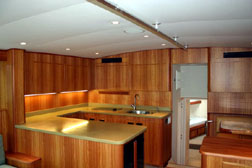 "Our best day was on that boat - 2 blue marlin and 5 white marlin caught in the Gulf of Mexico," he says.
"Our best day was on that boat - 2 blue marlin and 5 white marlin caught in the Gulf of Mexico," he says.
Meanwhile, second owner, Enrico Capozzi, has caught numerous world records on the boat, now named Spirit of Pilar II, off Costa Rica.
Conkle's 50-foot Miss Babbie is built for traveling and fishing.
"It has a bigger cockpit, which I think makes it easier to work the fish," he says.
Conkle adds, "Surgeons aren't good at multitasking and I found that out as I have gotten older. We started with manual teasing reels on the new boat and I quickly discovered that running the boat, raising fish and working the teasers was a lot for me to handle. So, we have switched to electric teasers. Hopefully this will help the old doc."
More of a fun fishermen than tournament angler, Conkle has fished his share of competitive fishing events, including the USVI Open/Atlantic Blue Marlin or 'Boy Scout' tournament.
"In my humble description, the opportunity to fish in St. Thomas is like being called up from the minors to play in the World Series," Conkle says.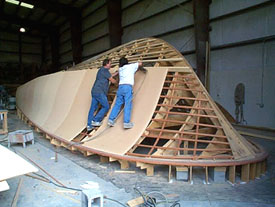
He adds, "all the tournament fishing I've done is tag and release. I haven't killed a blue marlin in the 30 years I've billfished. Marlin are magnificent animals and I think they all should swim. That's why I like Jimmy's (Loveland) tournament."
This summer will mark Conkle's return to fun fishing on the Gulf.
"Last year, the blue water was about 150 miles offshore of Pensacola," he says. "That's a long day, even for someone who isn't retired. Instead, Louisiana is only six hours away by water. We'll homeport there for the summer and fish. The oil rigs in the area have made great artificial reefs and there's plenty of baitfish. It's definitely living the dream."
